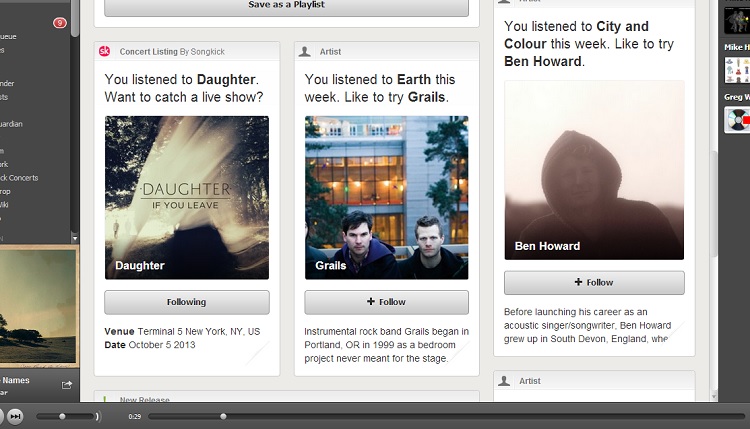Spotify has undoubtedly made my music listening life infinitely better, but there remain several areas in which it can improve. Recently the guys and gals in green made a huge stride in one of these areas, namely that of applying data to discovery.
I have plenty to write about on music discovery via algorithms versus the human touch, but here I simply want to shine a light on the elegant simplicity of integrating local concert listings into this broader recommendations channel.
From the Stream To the Show
This may seem like a natural extension – indeed, one that was already available by visiting the existing Songkick app tab – but the significance of bringing the show alongside song recommendations should not be overlooked.
Many users look for guidance on what to play when they first open a listening platform such as Spotify, meaning that the Discover page will be a highly visited area. Throw in what appears to be a much refined recommendation engine, one that has thrown up some genuinely intriguing unknowns for me in the last week, and you have the potential for a lot of eyeballs perusing these listings.
If even a small percentage begin to show an interest in the concert element of the page, it seems like something that all parties involved would benefit from developing further.
Personally, I see an increasingly valuable place for services like Songkick in both becoming a go-to source when I want to browse gig listings and delivering concert news to me. Combining my online listening history with that service helps to filter and improve the latter, making both services even more useful and raising the likelihood that I can be persuaded to purchase a ticket.
Next Steps
From integrating Facebook data to recommend shows based on the upcoming events of friends, to converting fan follows and listener likes into information that artists can use to better target their marketing, there are a great many extensions of this move that may bode well for music makers.
At a time when streaming services are regularly under fire for simply making money off the backs of the creators whose content fuels their business model, it is heartening to see moves being made to use the vast data sets they collect to pull fans further into the music.
Whether or not such connections actually drive up sales and attendances remains to be seen but, as any marketer will tell you, visibility, relevance, and a compelling call to action are key. Functions like Spotify’s Discover begin to solve the first two elements, but there will be a great deal of tweaking and dealing on the third before we begin to see a truly valuable connection between the listen and the live show.










.